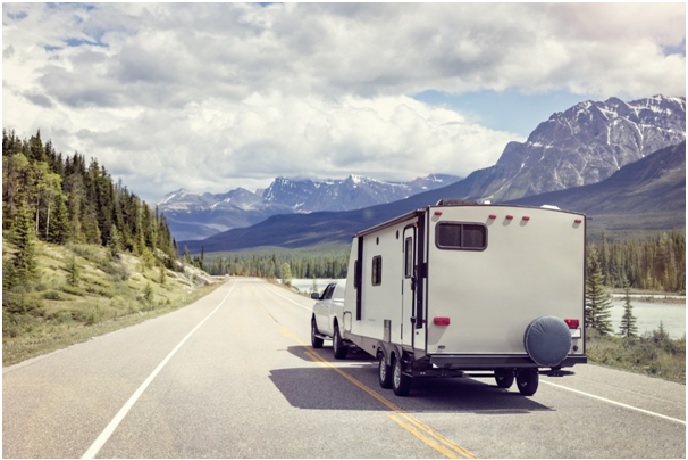

Contents
Are you looking to hit the open road this summer? If so, you’ve probably spent some time looking at the different types of motorhomes and RVs you can take on the road.
When deciding on a motorhome, one of the biggest things you need to consider is whether you should get an RV or a trailer. What’s the difference between the two? What are the pros and cons of each option?
Check out this RV vs trailer guide to learn which option is right for you.
Before we dive into the pros and cons of each of these options, you first need to understand the difference between an RV and a trailer. An RV falls into two broad categories: motorized RVs (which are also known as motorhomes) and towable RVs (which are also known as trailers).
In this article, we’ll be discussing the differences between a motorized RV and a towable RV.
A motorized RV comes with all of the driving and living functions under one roof. In other words, once you purchase or rent a motorized RV, you don’t need a separate vehicle to tow it around.
This means you don’t have to deal with the hassle of hitching and unhitching your vehicle when you set up camp. Motorized RVs fall into four categories: Class A, Class B, Class C, and campervans.
Class A motorhomes are the largest and roomiest RV type on the market. They offer all of the luxuries of a stationary home, as they come equipped with bedrooms, kitchens, living areas, and bathrooms. Some even come with fireplaces, washers and dryers, a central vacuuming system, and full-size refrigerators.
If you’re traveling with a large group or you plan to live in your RV full time, then a Class A motorhome may be the best choice for you.
Class B motorhomes resemble regular vans, but they’re much larger in size and can often comfortably fit up to four people. They also come with raised roofs for additional headspace.
Class C motorhomes come with many of the same comforts as Class A motorhomes, but they’re smaller in size. If you don’t want to give up your creature comforts but you’re traveling in a smaller group, a Class A motorhome may be the best bet for you.
Campervans are technically Class B motorhomes, but they’re smaller in size. These are petite campers that come with fold-out dining areas, compact cooking facilities, and limited living spaces. Very rarely are they outfitted with a bathroom.
A Class B motorhome or campervan is best for those who need a vehicle for a weekend getaway.
Trailers, also known as towable RVs, require vehicles so you can tow the RV from place to place. The size of the vehicle needed to tow the RV will depend on the trailer’s size and weight.
Once you reach your destination, all you need to do is unhitch the trailer so you can explore the surrounding area in your compact vehicle. There are five types of trailers to choose from:
Fifth-wheel trailers are the largest and most luxurious option on the market, whereas pop up campers are typically the most compact and affordable.
How do you know if you need an RV or a trailer? Here are the different factors you need to consider:
Generally speaking, RV motorhomes cost more than trailers. RV motorhomes will cost you at least $50,000, whereas RV trailers typically fall in the price range of $20k to $30k.
Of course, how much you pay will depend on the type of RV or the type of trailer you purchase. If you opt for a campervan, you could end up paying a lot less money than if you were to opt for a fifth-wheel trailer.
One of the biggest reasons people opt for trailers over RVs is because they offer more flexibility. Once you reach your campsite, you can unhitch your trailer and then explore the surrounding area in your car.
If you plan to go hiking, fishing, or biking, or if you want to explore the nearby town, then a trailer is way more convenient. With an RV, your parking options are limited, which means you pretty much only have the surrounding area to explore.
However, there are some RVs that come with hitches for vehicles. This means that you can attach your vehicle to the back of the RV so that when you stop somewhere, you can still use it to explore.
RV motorhomes are powered by diesel. While it depends on the size of your RV, you can expect to get about 15 miles per gallon. Many people are surprised to learn that most RVs can fit into the lanes at the gas station.
This means that you don’t have to do any special maneuvering to fill your RV up with gas.
Both trailers and RVs are going to depreciate over time. However, trailers tend to depreciate at a slower rate because they don’t have an engine.
RV vs Trailers: Which is Right for You?
Now that you’ve read this RV vs trailers guide, it’s time for you to decide which option is right for you. Both RVs and trailers make great vehicles for seeing the world, so it really comes down to personal preference and what you can afford.
Once you’ve purchased your RV or trailer, be sure to check back in with our blog for more road trip tips and tricks.
What is Content? To answer this, first one has to understand what is content. Content…
Pay-Per-Click (PPC) is the most popular way of digital marketing that allows a business to…
Investing in Gurgaon’s real estate market presents exciting opportunities, but a common dilemma for investors…
The year 2020 and the pandemic threw a wrench into everyone's plans. Companies that were…
AI is successful in boosting the productivity of organizations while helping them save cost and…
Suppose you battle back discomfort or other associated ailments due to sitting for lengthy periods…